
views
Providing the Right Kind of Support
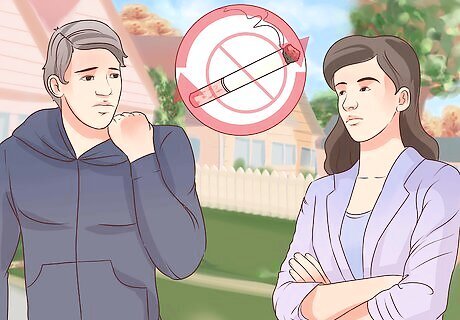
Don’t cite statistics. Your boyfriend knows that smoking is bad for him, and he probably wants to quit already. Thus, it won’t really be helpful to recite facts about diseases, life expectancy, etc. In fact, telling someone to stop smoking just makes them do it more. Instead, you may want to focus on trends in people's behavior and the role of addiction in smoking. Point out that smoking rates have steadily been going down over the past several decades, and that many people have successfully quit. Since many people start smoking to feel like they are part of a group, knowing that their behavior is increasingly uncommon may encourage them to quit. Pointing out that smoking is an addiction may help your boyfriend realize that he does not have control over his life. This probably does not appeal to him, so he may try to quit in order to be more autonomous.

Know that everyone is different. This means that the same strategies won’t work for everyone, but it also means that different people will want different levels and kinds of support. Talk to your boyfriend to find out what kind of help he needs. Your boyfriend may have an indirect way of indicating that he wants to talk about quitting. Pay attention to the topics he brings up—advice from a doctor, a family member who is pregnant, someone else who quit—to find an opening. Ultimately, you have to wait for him to be ready to quit. If he's not ready, no set of facts or pill is going to be convincing enough. It could help to encourage him to see a counselor—this can help him work through the underlying reasons or barriers that keep him from quitting.

If nothing like this comes up, look for a way to broach the topic gently. Maybe smoking laws or cigarette taxes are changing in your area. Ask your boyfriend how he feels about these, and use this as a transition to ask about his own habits. You: I read in an article today that the city is banning smoking in restaurants. Him: That's good. I hate eating when my food tastes smoky. You: I'm surprised to hear you say that. Will it be difficult for you to go that long without smoking? Him: No, I've actually been trying to cut down. You: Really? How can I help you do that?

Try the nudge method. It can be difficult to find the right balance between encouraging your boyfriend to quit and behaving in a way that he may perceive as taking away his choices. Lawyers and economists say the nudge method can incentivize change while still letting people decide for themselves. The nudge method works like this: tell your boyfriend to open a savings account into which he'll deposit the money he would otherwise spend on cigarettes. (A jar on the kitchen counter works, too.) At the end of a predetermined period, ask him if he has smoked. If he hasn't, he gets the money. If he has, the money has to be deposited to charity. Some versions of this method include the requirement that the charity be for a cause your boyfriend does not support! If he has a friend who is also trying to quit (or if you are), they can make it into a competition. Whoever goes longer without smoking gets to keep the money, and whoever gives in first has to donate to a charity of the winner's choice.

Mobilize your support network. If it is OK with your boyfriend, talk to your friends and family members about his plans, and encourage them to be supportive. Remind your boyfriend that doctors are part of your support network as well, and ask if he has considered making an appointment to talk about smoking cessation medication.

Think before checking in. Some smokers will want you to ask about their progress every day to hold them accountable, while others will find this habit invasive and counterproductive. Ask your boyfriend whether regular check-ins will be helpful or harmful for him.

Ask open-ended questions. Get your boyfriend talking about his experiences—why he started smoking, how it makes him feel, why he wants to quit, what makes quitting difficult, etc. These will give you a better sense of his relationship to cigarettes, and it might even help him make some connections he hadn’t made before. You: Why did you start smoking? Him: Because the older kids at school did. You: What about now? There aren't any older kids around. Him: I guess it just became a habit. You: Did you think you would smoke forever? Him: No, but quitting always seemed too hard. You: You can do it! Do you want me to help you come up with a plan?

Point out small victories. For a smoker, even going a day without cigarettes is an accomplishment. Recognize it as such, and use it as evidence that your boyfriend is capable of going without cigarettes. These small victories can increase confidence.

Focus on the whole person. Don’t let the quitting process become the entirety of your relationship. Even if he does want you to check in about his progress, ask him about his day and how he is more generally. It shouldn’t be just about whether or not he smoked today.
Focusing on the Long Term
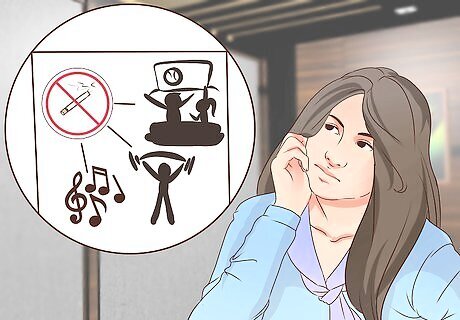
Make a plan, but be prepared to alter it. Having a tentative quit-by date can be motivating and give your boyfriend something to focus on, but it shouldn’t be set in stone. If he wants to set a date, make sure he knows that he has not failed if he hasn’t fully quit by this time.
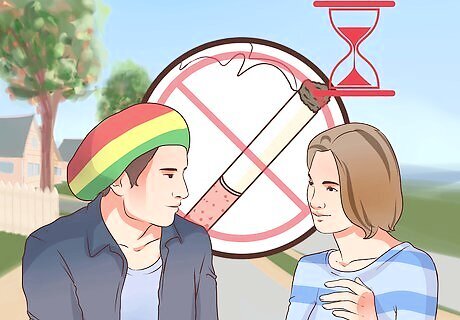
Emphasize the temporary nature of withdrawal symptoms. Many people will experience things like insomnia, inability to concentrate, anxiety, restlessness, irritability, and depression. These usually go away in a week or two. By reminding your boyfriend that they are temporary, you’ll help him believe that he can get through them.

Know that quitting is a learning curve. Many people take several attempts to quite smoking. If your boyfriend has a relapse, encourage him to learn from the experience so that next time he can avoid whatever caused him to smoke next time. Smoking is a learned behavior, and so is quitting.

Talk about when, not if. Relapses can be frustrating, so demonstrate to your boyfriend that it is only a matter of time before he tries again—and before he succeeds. In fact, most people who quit smoking and then have a relapse try again soon.
Offering Distractions

Get supplies. People smoke for many reasons, one of which is alleviating boredom. Your boyfriend will need some sort of substitute for this behavior. Consider keeping the following around: Hard candy to suck on Straws to chew on Cut up fruits and veggies

Spend time together. Use quitting as an excuse to engage in more activities together. Make dinner together, go to the movies, or check out a museum—anything to help take your boyfriend’s mind off of quitting.

Exercise. One of the activities that you engage in together should definitely be something physical. Exercise can alleviate many aspects of the quitting process, including the following: Anxiety Depression Irritability Weight gain
Protecting Your Health and Space

Don’t take it personally. People who are trying to quit smoking will often be irritable. Know that your boyfriend’s behavior is not about you. However, you certainly have the right to call him out on rude or unkind behavior and to get away from him entirely if this irritability becomes full-fledged abuse.
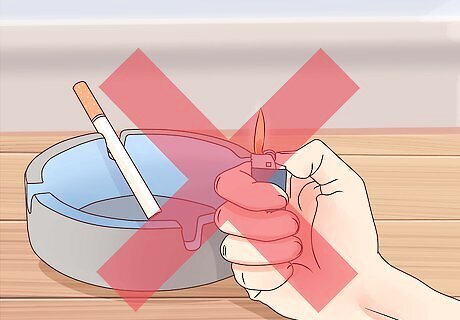
Make your home and car smoke-free spaces. This is especially important if you live together. If your boyfriend’s behavior exposes you to second-hand smoke, both of you are at risk for serious health problems. Moreover, people who don’t smoke at home are likelier to quit. Don’t keep lighters or ash trays in your home, either—this will just remind your boyfriend of what he’s avoiding.
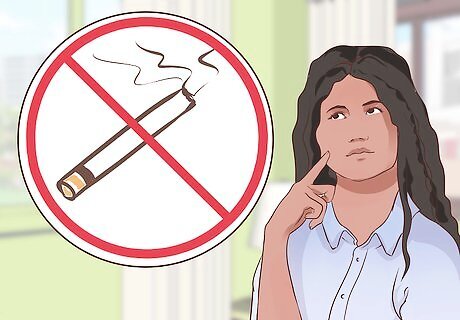
Avoid places where there will be smoking. This will not only further protect your own health, but also—by eliminating potentially triggering settings—help your boyfriend avoid the behavior.

Know your limits. How important is it to you that your boyfriend quit smoking? While there are steps you can take to help him quit, you will need to think about how you will proceed if he has no interest in doing so. Think about whether his smoking outweighs all of his other good qualities. Most people have serious flaws, and some experts suggest that having dealbreakers is not really conducive to happiness. The exception here is a serious moral or ethical shortcoming. Smoking does not really fall into this category, but it can prevent a long and healthy life. If losing your boyfriend to health problems down the road sounds too painful, smoking might just be too much for your relationship to overcome. If his smoking is a dealbreaker, he needs to be aware of it. It's not fair giving him an ultimatum he doesn't know about. Tell him that you cannot be with a smoker, but that you are confident he can quit and want to help him do so.




















Comments
0 comment